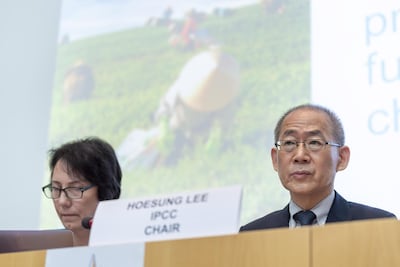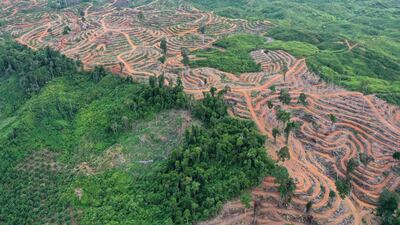Humans must stop wreaking havoc on the land to avoid catastrophic levels of climate change, scientists have warned.
They also suggested that switching to a plant-based diet could help in the fight.
In a major report released on Thursday, the UN’s Intergovernmental Panel on Climate Change laid bare the abuse inflicted on the Earth’s surface by humans through farming and development.
Soil is being lost between 10 and 100 times faster than it is forming, while the air over land is warming twice as fast as the world average. Climate change is going to exacerbate this and threaten millions with food insecurity, the report said.
Close to 500 million people now live in areas slowly turning into desert and, closer to home, UAE experts said more must be done to mitigate the effects of desertification in the Arabian Peninsula. The UAE's Ministry of Climate Change and Environment, meanwhile, said the country knew the importance of using environmental resources prudently and preserving them for future generations.
The far-reaching study by 107 scientists shows that forests have been flattened, peatlands drained and soil eroded. Human use affects about 70 per cent of the world’s ice-free land surface and this has turned the land from something that should trap emissions into a creator of them.
The 2015 Paris climate deal seeks to limit global average temperature increases to 1.5°C above pre-industrial levels and this can be achieved only by reducing emissions from all sectors – including land and food, the scientists said.
“The findings of the report are stark. We cannot reach the goals of the Paris Agreement … without sustainable land management,” said Inger Andersen, executive director of UN’s Environment Programme, who warned the world has a “closing window” to act.
“It is vital that we change our relationship with the land and recognise that what is beneath our feet offers nature-based solutions such as agro-forestry and peatland protection,” she said.
Uncultivated land with bogs, trees and forests traditionally absorbed CO2 gases – a major contributor to the Earth’s warming. But with the advent of industrialised agriculture, land denuded of natural vegetation is actually becoming an emitter of CO2. About a quarter of greenhouse gas emissions now come from agriculture, forestry and other land use.

If these trends are not reversed, the report warned that people across the globe face food insecurity, water shortages and extreme weather events. The warning follows a string of extreme weather events such as declining Arctic sea coverage and European heatwaves. July, meanwhile, was the hottest month ever recorded.
Qais Al Suwaidi, a climate change expert at the UAE's ministry, said all hands on deck were needed to confront the challenges.
"The UAE is making headway in greening its deserts, protecting its wetlands that function as carbon sinks and adopting modern agricultural techniques to achieve efficient use of its land and water resources," he said, following the report's publication.
"Realising that unsustainable consumption patterns are not tenable in the long term, the UAE is making concerted efforts to shift the public mindset towards adopting sustainable, environment-focused consumption habits, which will significantly reduce food waste and preserve the natural resources that go into its production."
The Special Report on Climate Change and Land also outlined that rising demand for red meat is placing massive pressure on the land to produce animal feed, as well as contributing to half of the world’s emissions of methane - another greenhouse gas. Consumption of meat and vegetable oils has doubled since the 1960s and much of this type of agriculture relies on fossil fuels to create fertilisers and power machinery.
“About a quarter of the Earth’s ice-free land area is subject to human-induced degradation,” the report said.
Some of the solutions offered include protecting what is left of the world’s natural forests, grow more trees, eat less red meat and save mangrove and peatlands.
Experts in the UAE also stressed that the effects of desertification needed to be taken seriously here.
“With 70 to 90 per cent of the Arabian Peninsula under threat of desertification, new measures must be attempted to sustain development in the region and limit desertification,” said Diana Francis, atmospheric scientist at New York University Abu Dhabi. “Particularly, measures encouraging planting trees and developing green areas are needed."
Dr Francis said the effects of drought and desertification also have a human cost. “They cause loss of productivity with serious impacts on food production, future food security, economic development and additional stress on natural resources,” she said. “Therefore the threat of desertification needs to be considered seriously.”
At a conference in Abu Dhabi in June, UN secretary general, Antonio Guterres, said the world faced a fight for its life in the battle against climate change. Now the attention turns to New York where in September, an emergency UN summit convened by Mr Guterres will seek to boost commitments under the Paris agreement.


